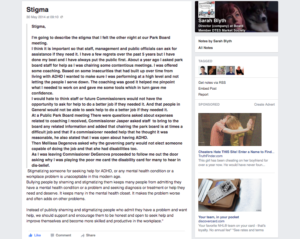Former Vancouver Park Board Commissioner, Sarah Blyth, opens up about politics, disabilities, stigma, and success for our first installment of “We Put the ‘Able’ in ‘Disabled'”
By: Rory Mondshein
In the United States, 1 in 20 children are diagnosed with Attention Deficit Disorder or Attention Deficit Hyperactivity Disorder, which is characterized by inattentiveness, hyperactivity, and impulsiveness. Around the world, 3 to 7 percent of school-aged children are diagnosed with some form of attention deficit. It affects 1 to 4 percent of adults worldwide.
Unfortunately, although attention deficit is quite common around the world, it is very highly stigmatized because there are a lot of misconceptions about the disorder.
On the one hand, many refuse to acknowledge that AD(H)D is a legitimate disorder on its own accord. Instead, they believe that the symptoms are indicative of either other disorders or plain indolence and poor discipline.
All too often, AD(H)D patients are told that they need to “buckle down” and pull it together, as opposed to simply relying on medications to help them.
However, although AD(H)D is treated with medication that helps them perform daily tasks, governments impose strong regulations that force AD(H)D patients to spend exorbitant amounts of money to obtain the medication they need to survive.
In addition to the economic factor, many misconceptions about the disorder, including the argument that it is nonexistent, complicate life for AD(H)D patients because it precludes them from getting the help and accommodations that they need to withstand everyday challenges.
On the other hand, there are people that accept AD(H)D as a legitimate disorder, but mischaracterize it.
Some see AD(H)D as a cognitive defect that is associated with mental illness, which leads to social isolation. In the past, students with AD(H)D were often sequestered and taught separately, which took an ableist approach to learning and suggested that schools valued the collective over the individual right to education. According to a study in the Journal of Interpersonal violence, children with AD(H)D are more likely to be bullied by their peers than other groups.
The combination of academic obstacles and social stigma lead many students AD(H)D to drop out.
According to a study conducted by the UC Davis Medical Center, 28.6 percent of students with AD(H)D drop out of school, which has adverse impacts on the rest of their lives.
Unfortunately, in light of all of these circumstances, many focus on the negative, as opposed to the positive contributions that people with AD(H)D make, which is why we find that many people with this disorder are reluctant to publicly admit that they have it.
As it stands, there is only one politician in North America that has publicly admitted to having AD(H)D while in office. Her name is Sarah Blyth, and she served as the Chair of the Vancouver Park Board from 2008 to 2014. Today, I was fortunate enough to have the chance to sit down with her her to discuss her disability and her successful career, as well as address the many misconceptions about AD(H)D.
Tell us about yourself
I was the Former Chair of the Vancouver Park Board; I served from 2008 to 2014. [It] entailed overseeing the policy and budget for Vancouver Parks and Recreation.
What inspired you to become a politician?
When I was a youth, I helped to run a big indoor skatepark in Vancouver. It was such a great service, but eventually it was going to cost too much to get it up to fire code. Our building did not have the proper zoning, so it became an uphill battle with the City, and eventually we shut down. In the meantime, we started to meet with local bureaucrats and politicians about what we could do to make our city more skatable because kids had nowhere to go, and, when they skated on the streets, they got their boards taken away. I worked through the process advocating for skateparks a few times, and then I felt ready to help other people have a say in how we spend tax dollars on Parks and Recreation. In my two terms we approved skateparks. Now, we have nine: the first ever BMX dirt jumps (now we have two); Parcour; Bike Polo; Kite Surf Launch; Dude Chilling Park; and lots of other fun stuff. We also approved a policy that a youth element be included where possible in every new park
Tell me about your disability
I’m ADD, I have anxiety, and I’m also dyslexic. [I was diagnosed] when I was a kid — early on, around 6. I dropped out of school in grade ten and got on with my life. I had no self confidence; I just couldn’t do it.
When you dropped out, what did you imagine your life would look like?
I just tried to not think about it until I found hope through a youth worker at a community centre who believed in me and helped me achieve some of my goals and took the time to teach me skills.
How do your disabilities affect you?
I hyper concentrate. I lose my keys, my mind races with thoughts. I’ll be reading a book and my mind will float on to something else. I lose my keys, my mind races with thoughts. I’ll be reading a book and my mind will float on to something else. If I am bored with something, my mind wanders so I have to find ways to bring my attention back; taking notes helps, [as does] having a long walk before a meeting.
How much does your disability affect your daily life?
All day, everyday, but thankfully I know how to manage things for myself. I drink lots of coffee, [take] melatonin to sleep — no booze or drugs — otherwise there is enough going on in my mundane already.
What are the best parts of your disability?
I can hyper focus, I’m creative I see things from another perspective.
What are the best parts of you?
I try to be a good mother, I say what’s oy mind so you know where I’m at I’m a good organizer.
How do you treat your disabilities?
I ride a bike, and I go for long walks. It seems to help me clear my thoughts and tires my brain out a bit. [I] take notes, make calendars, and reminders. I have to have a spot for everything because I don’t concentrate on details like where I put things.
Why did you decide to open about your disabilities? Were you afraid?
I put something on Facebook and a reporter from the Georgia Straight picked it up and asked me about it, so I thought: “what the hell? Maybe some people out there feel the same and go through what I do.” No one else really understands: you can read about it in a book, but whatever — I had gotten to a point in life where I no longer gave a shit what people thought about me. I know who I am, what my barriers are, [and] how to overcome.
How did people react?
People were relieved that they were not the only one and that you can be smart, creative and functional while having mental health issues and that we have strengths because of our interesting brains.
Did you experience any negative reactions?
Yes but only from ignorant idiots although you have to be the better person and try and use the situation as a learning moment.
Can you give me an example?
I had asked for some training as I was the Chair of the Park Board governing a multi million dollar budget. I felt it would help give me confidence that I was making good decisions for the public. I explained the reasons behind it, and one of the other board members accused me of playing the “poor me disability card” shaming me for my honesty and that I should have been prepared.
How did that make you feel?
I was disgusted.
What did you do in response?
I wrote about my experience at the park board on Facebook
Can you show me what you wrote?
How did people react?
Many people contacted me who had similar experiences and felt the same way I did, and have dealt with mental stigma at some point in their lives.
How did you feel?
It’s a wonderful feeling to know you are not alone.
Did you ever regret speaking about it?
Sometimes I think about it and wonder was that the right thing to do people who don’t get it (and there are many) must think I’m not capable. Like I’m married to people’s stigma, and I have to prove I’m capable.
What is the biggest misconception about your disability?
That I’m not fully capable and that I am some kind of oddball.
What do you wish people knew about it?
That people with ADHD may need a little understanding but they are the same as everyone else just wired different.
Does your disability affect your political stances? If so, how?
Any struggle teaches you life lessons. My mind is open, I don’t beat around the bush. I understand mental health and have seen first hand how people struggle and unnecessarily.
What do you think needs to be done to reduce the stigma?
Lots of Education. Our culture simply wants to toss people who are different in any way aside and they fall through the cracks which in the end costs more through the prison system and healthcare.
What does Canada do well for people that have disabilities?
As much as I feel that the school system is being sucked dry and replaced with private schools. I do believe we have the knowledge and that we have come along way from the bad kid or the class clown and that kids have different needs they have the tools and sometimes they use them unfortunately add is not enough to qualify for extra help but teachers do their best to distribute help as needed we just need to let the government that they should broaden the scope of disabilities that get help. Front loading the education system will improve so many lives.
What would you like to see for the world?
I would like to see equality and respect for women, a justice system that works for poor people, [and] people with disabilities given the same chance as everyone else to succeed.
How can we change the conversation?
We need to educate people, we need to help kids when they are young so they don’t fall through the cracks of society
Thank you so much for interviewing with us.
Special thanks to ADD Coach, Peter Quily, for teaching us about AD(H)D treatment around the world. Please visit http://www.addcoach4u.com/ for more information about Attention Deficit (Hyperactivity) Disorder.
Editor’s Note: This article is part of the “We Put the ‘Able’ in ‘Disabled'” series, which will feature scintillating interviews with politicians, CEOs, professors, and other successful people that struggle with invisible illnesses in order to change the conversation about health care and disability rights.


